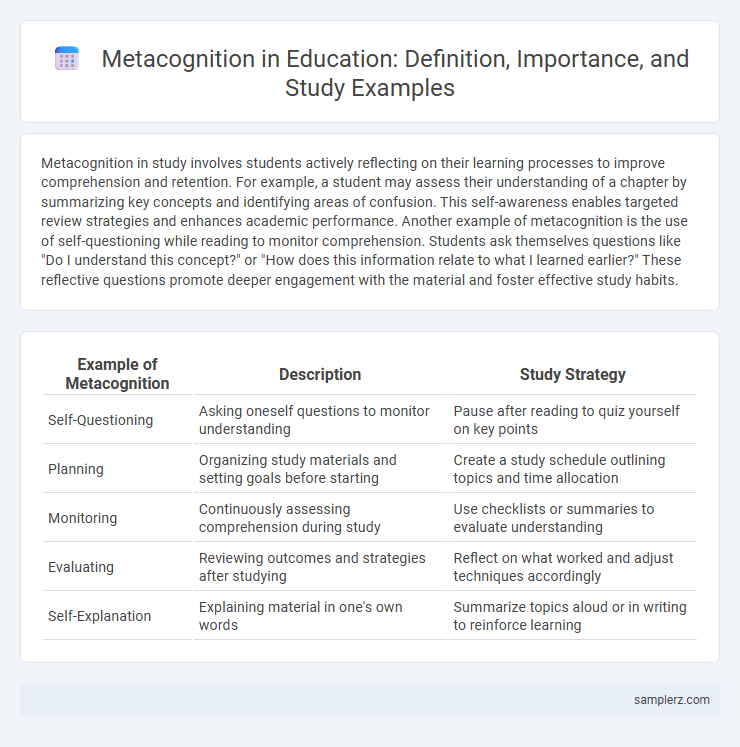Metacognition in study involves students actively reflecting on their learning processes to improve comprehension and retention. For example, a student may assess their understanding of a chapter by summarizing key concepts and identifying areas of confusion. This self-awareness enables targeted review strategies and enhances academic performance. Another example of metacognition is the use of self-questioning while reading to monitor comprehension. Students ask themselves questions like "Do I understand this concept?" or "How does this information relate to what I learned earlier?" These reflective questions promote deeper engagement with the material and foster effective study habits.
Table of Comparison
| Example of Metacognition | Description | Study Strategy |
|---|---|---|
| Self-Questioning | Asking oneself questions to monitor understanding | Pause after reading to quiz yourself on key points |
| Planning | Organizing study materials and setting goals before starting | Create a study schedule outlining topics and time allocation |
| Monitoring | Continuously assessing comprehension during study | Use checklists or summaries to evaluate understanding |
| Evaluating | Reviewing outcomes and strategies after studying | Reflect on what worked and adjust techniques accordingly |
| Self-Explanation | Explaining material in one's own words | Summarize topics aloud or in writing to reinforce learning |
Recognizing Knowledge Gaps: Self-Assessment in Learning
Students practicing metacognition engage in self-assessment by identifying areas where their understanding is incomplete or unclear, which helps target specific knowledge gaps. Techniques like reflective journaling and asking self-generated questions enable learners to monitor their comprehension and adjust study strategies effectively. Research shows that recognizing knowledge gaps through metacognitive strategies significantly improves academic performance and promotes deeper learning.
Planning Effective Study Strategies
Students employing metacognition in planning effective study strategies often begin by assessing their understanding of the material and identifying areas of weakness. They set specific goals, allocate appropriate time for each topic, and select techniques like summarization, self-testing, or concept mapping to enhance retention. Regularly monitoring progress and adjusting methods based on feedback ensures more efficient and targeted learning outcomes.
Monitoring Comprehension during Reading
Monitoring comprehension during reading involves actively checking understanding of the material by summarizing key points and identifying unclear sections. Students practicing metacognition pause periodically to ask themselves questions about the content and reread difficult passages for clarity. This strategy improves retention and critical thinking by fostering self-awareness of cognitive processes throughout the study session.
Adjusting Approaches Based on Feedback
Students enhance learning outcomes by actively monitoring their comprehension and modifying study techniques when encountering challenging material. Implementing strategies like summarizing content or seeking clarifications based on quiz results promotes deeper understanding and retention. This metacognitive adjustment fosters effective problem-solving skills crucial for academic success.
Reflective Journaling for Learning Improvement
Reflective journaling is a powerful metacognitive strategy that enhances self-awareness and regulates learning processes by encouraging students to analyze their understanding and study habits. By regularly writing about challenges, insights, and progress, learners develop critical thinking skills and identify areas for improvement. This practice fosters deeper comprehension and promotes continuous academic growth.
Goal Setting and Progress Tracking
Goal setting in study involves students defining clear, specific learning objectives to enhance focus and motivation. Progress tracking uses tools like checklists, journals, or digital apps to monitor achievements and adjust strategies accordingly. This metacognitive approach boosts self-regulation and improves academic performance by fostering awareness of learning processes.
Self-Questioning Techniques for Deeper Understanding
Self-questioning techniques in study involve students actively asking themselves questions like "What is the main idea?" or "How does this information connect to what I already know?" These metacognitive strategies enhance comprehension and retention by promoting deeper engagement with the material. Research shows that learners who regularly practice self-questioning improve critical thinking skills and achieve higher academic performance.
Evaluating Study Outcomes and Methods
Evaluating study outcomes and methods involves reflecting on test results and the effectiveness of learning strategies to identify strengths and areas for improvement. Students use metacognition to assess whether specific techniques, such as summarizing or self-testing, improved retention and understanding of material. This process enhances academic performance by promoting adaptive changes in study habits based on critical self-analysis.
Utilizing Concept Mapping to Organize Thoughts
Utilizing concept mapping in study enhances metacognition by enabling students to visually organize and connect ideas, improving comprehension and retention. This strategy supports self-regulation as learners actively monitor their understanding and identify knowledge gaps. Concept maps facilitate deeper cognitive processing, promoting critical thinking and efficient information retrieval during exams.
Seeking Help and Resources When Stuck
Students practicing metacognition often recognize when they are stuck and proactively seek help from teachers, peers, or online resources to overcome learning obstacles. Utilizing tools such as educational forums, tutoring sessions, or study groups enhances their problem-solving strategies and deepens understanding. This reflective approach to studying improves academic performance by promoting self-awareness and adaptive learning behaviors.

example of metacognition in study Infographic
 samplerz.com
samplerz.com